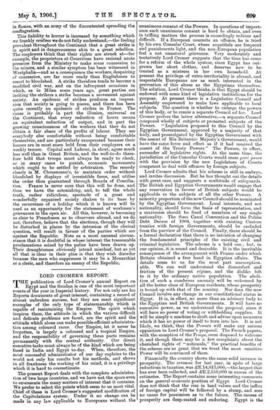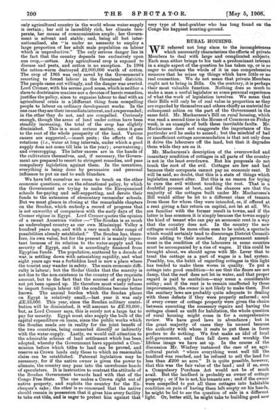LORD CROMER'S REPORT.
THE publication of Lord Cromer's annual Report on Egypt and the Soudan is one of the most important events of the year in Imperial history. For not only are his Reports documents of great interest, containing a record of almost unbroken success, but they are most significant examples of the only type of statesmanship which is capable of maintaining the Empire. The spirit which inspires them, the attitude in which the various difficult and delicate problems are faced, are the spirit and the attitude which alone can make possible efficient administra- tion among coloured races. Our Empire, let it never be forgotten, is largely a coloured and a tropical Empire, and the responsibility of governing these parts remains permanently with the central authority. Our direct executive tasks must always be of the kind which are being faced in India and Egypt to-day. When, therefore, the most successful administrator of our day explains to the world not only his results but his methods, and shows in all frankness the working of his mind, it is a privilege which it is hard to overestimate.
The present Report deals with the complete administra- tion of two large countries, and we have not the space even to enumerate the many matters of interest that it contains. We prefer to select the points which seem to us most vital. Chief of these is Lord Cromer's suggested modification of the Capitulations system. Under it no change can be made in any law applicable to Europeans without the unanimous consent of the Powers. In questions of import- ance such unanimous consent is hard to obtain, and even in trifling matters the process is exceedingly tedious and difficult. If a European commits an offence, he is tried by his own Consular Court, where acquittals are frequent and punishments light, and the non-European population feel a not unnatural grievance. Very moderately and tentatively Lord Cromer suggests that the time has come for a reform of the whole system, since Egypt has out- grown her short clothes, and deserves now to be treated as a mistress in her own household. At present the privilege of extra-territoriality is abused, and respectable Europeans are as much interested in the prevention of this abuse as the Egyptians themselves. The solution, Lord. Cromer thinks, is that Egypt should be endowed with some kind of legislative institutions for the purpose. At present there is a Legislative Council and Assembly empowered to make laws applicable to local subjects. The question is whether to enlarge the powers of this body, or to create a separate Council ad lux. Lord Cromer prefers the latter alternative,—a separate Council composed. wholly of subjects or protected subjects of the Powers. "Legislation proposed to this Council by the Egyptian Government, approved by a majority of that body, and promulgated by the Egyptian Government with the assent of His Britannic Majesty's Government, would have the same force and effect as if it had received the assent of the Treaty Powers." The Powers, in effect, surrender all legislative rights. At the same time, the jurisdiction of the Consular Courts would cease pan i imam with the provision by the new Legislature of Courts competent to deal with offences by foreign subjects.
Lord Cromer admits that his scheme is still in embryo, and invites discussion. But he has thought out the details with great care, and suggests a multitude of safeguards. The British and Egyptian Governments would engage that any reservation in favour of British subjects would be applicable to the subjects of all the other Powers. A minority proportion of the new Council should be nominated by the Egyptian Government. Local interests, and not nationality, should form the basis of representation, and a maximum should be fixed of members of any single nationality. The Suez Canal Convention and the Public Debt Decree of 1904, together with existing Custom treaties with foreign Governments, should be excluded from the purview of the Council. Finally, there should. be a formal declaration that there is no intention of changing the fundamental principles of the existing civil and criminal legislation. The scheme is a bold one ; but, in our opinion, it is sound and desirable. It is the inevitable consequence of the arrangement with France under which Britain obtained a free hand in Egyptian affairs. The details seem to us for the most part unexception- able. We can well understand the discomfort and friction of the present regime, and the dislike felt to it by the ordinary native population. The aboli- tion of such a cumbrous anomaly will be welcomed by all the better class of European residents, whose prosperity is bound up with that of the country. Nor does the new Council involve any change in our constitutional status in Egypt. It is, in effect, no more than an advisory body to the Egyptian and British Governments. It will have no executive power, as we understand the proposal, since it will have no power of voting or withholding supplies. It will be simply a machine to draft and advise upon measures which it has no power of itself to turn into law. It is not likely, we think, that the Powers will make any serious opposition to Lord Cromer's proposal. The French papers, with the exception of the Temps, seem disposed to welcome it, and. though there may be a few complaints about the cherished rights of "nationals," the practical benefits of the scheme are so great that we trust the most sensitive Power will be convinced of them.
Financially the country shows the same solid increase in prosperity. The revenue for last year, in spite of large reductions in taxation, was .2E.14,813,000,—the largest that has ever been collected, and £E.2,558,000 in excess of the estimates. The Report contains some interesting comments on the general economic position of Egypt. Lord Cromer does not think that the rise in land values and the influx of foreign capital will be followed by a slump, and sees no cause for pessimism as to the future. The causes of prosperity are deep-seated and enduring. Egypt is the only agricultural country in the world whose water-supply is certain ; her soil is incredibly rich, her climate tem- perate, her means of communication ample; her Govern- ment is solvent and stable ; and, being all but inter- nationalised, she "is under no necessity to employ a large proportion of her adult male population on labour which is unproductive." The only serious danger lies in the fact that the country depends too exclusively upon one crop,—cotton. Any agricultural crop is exposed to disease and pests, and cotton is no exception. In 1904 the cotton-worm destroyed £2,000,000 worth of cotton. The crop of 1905 was only saved by the Government's resorting to forced labour in the threatened districts. The people came out willingly, and the danger was averted. Lord Cromer, with his serene good sense, which is neither a slave to doctrinaire maxims nor a devotee of heroic remedies, justifies the policy, since to organise labour to deal with an agricultural crisis is a idifferent thing from compelling people to labour on ordinary development works. In the one case they see their immediate interest, and are persuaded; in the other they do not, and are compelled. Curiously enough, though the areas of land under cotton have been steadily increasing, the total of the crop has slightly diminished. This is a most serious matter, since it goes to the root of the whole prosperity of the land. Various causes are suggested,—insect pests ; the effects of the rotations (i.e., water at long intervals, under which a good supply does not come till late in the year) ; overwatering ; and overcropping. The latter causes are in the hands of the cultivators themselves, and, if necessary, the Govern- ment are prepared to resort to stringent remedies, and pass compulsory legislation against them. In the meantime, everything is being done by persuasion and personal influence to put an end to such blunders.
We have left ourselves no room to touch on the other economic questions, or on the educational policy, by which the Government are trying to make the Europeanised schools fee-paying and self-supporting, and devote their funds to the extension of elementary vernacular schools. But we must glance in closing at the remarkable chapters on the Soudan, which embody a record of progress that is not unworthy of comparison with the early days of the Cromer regime in Egypt. Lord Cromer quotes the opinion of a recent American visitor :—" The Soudan is as much an undeveloped country as our own Mississippi Valley a hundred years ago, and with a very much wider range of possibilities already established." The Soudan has, there- fore, its own value, but for the present it is mainly impor- tant because of its relation to the water-supply and the security of Egypt, and it is accordingly financed from Egyptian funds. The population, scattered by a decade of war, is settling down with astonishing rapidity, and what eight years ago was a forbidden land is now a place where the tourist may wander in safety. The main economic diffi- culty is labour; but the Sirdar thinks that the scarcity is not due to the non-existence in the country of the requisite amount, but to the fact that the sources of supply have not yet been opened up. He therefore most wisely refuses to import foreign labour till the conditions become better known. The annual burden which the Soudan places on Egypt is relatively small,—last year it was only ..E.33,000. This year, since the Soudan military contri- bution will he diminished, it will amount to £E.93,000; but, as Lord Cromer says, this is surely not a large tax to pay for security. Egypt must also supply the bulk of the capital expenditure on loans, since the public works which the Soudan needs are in reality for the joint benefit of the two countries, being connected directly or indirectly with the water-supply. Lastly, we would call attention to the admirable scheme of land settlement which has been adopted, whereby the Government have appointed a Corn-' mission before which titles to land can be proved, and reserve as Crown lands only those to which no reasonable claim can be established. Paternal legislation may be necessary, for if the native owner is given the power to alienate, the country may pass into the unwelcome hands of speculators. It is instructive to contrast the attitude of the Soudan Government towards land with that of the Congo Free State. The one makes a Crown right out of native property, and exploits the country for the Ex- chequer's sake; the other is so concerned that the native should remain in possession that it gives him every facility to take out title, and is eager to protect him against that very type of land-grabber who has long found on the Congo his happiest hunting-ground.









































 Previous page
Previous page